TODAY’S READING FROM THE OLD TESTAMENT- JOB 12:1-15:35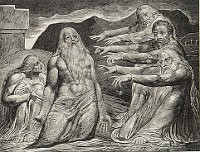
Job’s three friends, Eliphaz (Job 4:1-5:27), Bildad (Job 8:1-22), and Zophar (Job 11:1-20) have had their say. Job completes the first round of debate by continuing to defend his own integrity and God’s integrity as far as he can understand what that means. The conversation has hit upon some of life’s truisms, yet when it comes to explaining the problem of evil and suffering, their combined philosophies prove the limits of human understanding. Job’s philosophy is more profound and true to God’s Word than those of his friends. But their discussion reveals that the world by human wisdom did not know God.
1 Corinthians 1:20-21 20 Where is the wise man? Where is the scribe? Where is the debater of this age? Has not God made foolish the wisdom of the world? 21 For since in the wisdom of God the world through its wisdom did not come to know God, God was well-pleased through the foolishness of the message preached to save those who believe.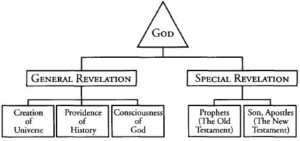
It is not until the special revelation of God’s purpose and character in the Person of Christ given in the New Testament, that the questions raised in the book of Job can be more fully answered.
We can know something of God’s wisdom and power as the Creator and Sustainer of the universe through the general revelation of the witness of creation (Romans 1:20). The moral dictates of the human conscience function as an indicator of the moral nature of God and mankind’s accountability to heed them (Romans 2:14-16).
God gives ample evidence of His supreme intelligence and sovereign power in the created universe so that mankind is without excuse.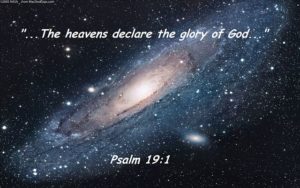
Romans 1:20 20 For since the creation of the world His invisible attributes, His eternal power and divine nature, have been clearly seen, being understood through what has been made, so that they are without excuse.
Job 12:8-10 8 “Or speak to the earth, and let it teach you; And let the fish of the sea declare to you. 9 “Who among all these does not know That the hand of the LORD has done this, 10 In whose hand is the life of every living thing, And the breath of all mankind?
Job affirms divine sovereignty as the Creator and sustainer of all life, including the life of mankind.
He responds to Zophar’s three accusations, starting with the accusation that Job had no knowledge of God (Job 11:5-12). Job is vehement in his defense of his understanding of the philosophy of God.
Job 12:3 3 “But I have intelligence as well as you; I am not inferior to you. And who does not know such things as these?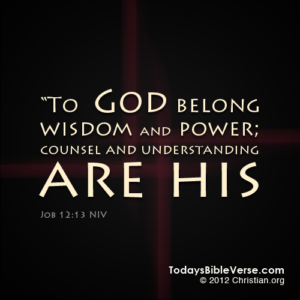
He defends the God-given capacity of human discernment and the benefit of knowledge gained by experience.
Job 12:11-12 11 “Does not the ear test words, As the palate tastes its food? 12 “Wisdom is with aged men, with long life is understanding.”
In verses 13-22 Job declares God’s sovereign rule over all things. He has the power to build up and bring low both individuals and nations.
He enables human beings to understand His creation by bringing hidden things to light.
Job 12:22 22 “He reveals mysteries from the darkness and brings the deep darkness into light.”
The missing element in Job’s defense is an understanding of God’s character. The truths pertaining to God’s character remain somewhat hidden in the Old Testament, until they are made more clearly known when the Word is made flesh in Jesus Christ.
John 14:9 9 Jesus *said … He who has seen Me has seen the Father; how can you say, ‘Show us the Father’?
In Chapter 13, Job continues to defend his integrity. He answers Zophar’s first accusation that he is guilty and being punished for his sins (Job 11:1-4).
Job shows sarcastic contempt for the counsel of his friends. He declares that he is equal to his friends in his ability to gain knowledge by natural means.
Job 13:2 2 “What you know I also know; I am not inferior to you.
He is convinced that they are making unjust conclusions about his personal state and misrepresenting God in His dealings with him.
Job 13:4 4 “But you smear with lies; You are all worthless physicians.
Job 13:12 12 “Your memorable sayings are proverbs of ashes, Your defenses are defenses of clay.
Job tenaciously holds on to a higher view of God’s character, believing that no matter what the situation, He is trustworthy, and Job is determined to trust Him.
Job 13:15 15 “Though He slay me, I will hope in Him. Nevertheless I will argue my ways before Him.”
Job is confident that his right standing with God and his trust in Him will be vindicated (Job 13:16-19).
Job 13:20-28 is directed towards God more than to Job’s friends.
Job 13:24-25 24 “Why do You hide Your face and consider me Your enemy? 25 “Will You cause a driven leaf to tremble? Or will You pursue the dry chaff?”
In Chapter 14 Job answers Zophar’s third accusation, asserting that there is still hope if Job will only heed Zophar’s religious prescription to get right with God.
Job admits that his hope is waning and almost gone, but somehow God will prove Himself true to His promises.
He recognizes the reality of death and the limits of our natural capacities and our days on the earth.
He admits that there is much uncertainty about the future and what happens after death.
He observes from the natural world that there are hints of resurrection. He sees how the life of a tree resurfaces when it is cut down to a stump. But where is there evidence of our future life after death.
His hope is eroding away as waters erode rocks and shore.
This chapter longs for the revelation of The Resurrection and the Life that is made known in Jesus Christ (John 11:25).
In the New Testament Paul will affirm in the resurrection chapter which we continue to read today (1 Corinthians 15) and in 2 Timothy, that Jesus answers the question Job asks in Job 14:14
Job 14:14 14 “If a man dies, will he live again? All the days of my struggle I will wait Until my change comes.”
John 11:25 25 Jesus said to her, “I am the resurrection and the life; he who believes in Me will live even if he dies,
2 Timothy 1:8-10 8 Therefore do not be ashamed of the testimony of our Lord or of me His prisoner, but join with me in suffering for the gospel according to the power of God, 9 who has saved us and called us with a holy calling, not according to our works, but according to His own purpose and grace which was granted us in Christ Jesus from all eternity, 10 but now has been revealed by the appearing of our Savior Christ Jesus, who abolished death and brought life and immortality to light through the gospel,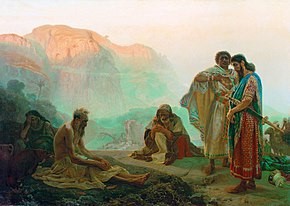
In Chapter 15 the second round of debate begins. Eliphaz continues his attack on Job.
He accuses Job of being full of prideful hot air and self-righteousness.
Eliphaz resorts to his advanced age in his attempts of one-upmanship.
He proceeds along the lines of his first argument that God rewards the righteous and punishes the guilty. In his first oration he states this in general terms. In round two he emphasizes the fact that God punishes the evil. It is true that God is just, but this is not the whole truth. Missing in Eliphaz’s reasoning is the revelation of God’s character in Jesus Christ and His provision of full redemption through the work He accomplished on the cross.
Eliphaz was misapplying this truth in relationship to Job. Eliphaz sees Job as being afflicted because of his sin.
Job 15:34-35 34 “For the company of the godless is barren, and fire consumes the tents of the corrupt. 35 They conceive mischief and bring forth iniquity, and their mind prepares deception.”
The true believer can say with King David.
Psalm 32:1-2 1 How blessed is he whose transgression is forgiven, whose sin is covered! 2 How blessed is the man to whom the LORD does not impute iniquity, and in whose spirit there is no deceit!
May we be wary of the wisdom of men, even regarding spiritual things. May we learn to cast the full weight of our trust upon the good news of the finished work of redemption accomplished by our Lord and Savior Jesus Christ!
TODAY’S READING FROM THE NEW TESTAMENT – 1 CORINTHIANS 15:29-58
We just read in the Book of Job the classic question regarding life after death:
Job 14:14 14 “If a man dies, will he live again? All the days of my struggle I will wait until my change comes.
Job’s patience (James 5:11) is found in his ability to wait until the Lord perfects what concerns us-the redemption of our bodies in the resurrection.
In Philippians 3:20 Paul expresses the believer’s resurrection hope this way:
Philippians 3:20-21 20 For our citizenship is in heaven, from which also we eagerly wait for a Savior, the Lord Jesus Christ; 21 who will transform the body of our humble state into conformity with the body of His glory, by the exertion of the power that He has even to subject all things to Himself.
The resurrection assures us that Jesus’ payment for sin satisfies the justice of God by fulling paying our sin debt.
Paul has answered the question WHETHER the dead will be raised (1 Corinthians 15:1-19) with the proof of Jesus’ promised physical resurrection.
Then goes on to explain WHEN the dead will be raised (1 Corinthians 15:20- 28) with the illustration of the sequential order of the firstfruits and the following harvest and kingdom reign.
He then answers the question of WHY the dead are raised and how it motivates us (1 Corinthians 15:19-20, 29-34; 49-50).
The resurrection shows us that this present life is not all that there is. We have the hope of an eternal life reigning with Christ in God’s kingdom in the future.
1 Corinthians 15:19-20 19 If we have hoped in Christ in this life only, we are of all men most to be pitied. 20 But now Christ has been raised from the dead, the first fruits of those who are asleep.
The resurrection of Jesus is a guarantee of our future resurrection and our life together with Him.
Paul knew that for him to live was Christ and to die was gain (Philippians 1:21). He could gladly spend his life pouring himself out to others for the sake of the gospel, even if it meant facing the possibility of death daily.
The resurrection makes clear that there is a Day of Reckoning to come after the Resurrection, so we need to steer clear of deceptive worldviews. Paul cites the deceitful philosophy of the materialists and Epicureans who lived only for the pleasures of this life.
He could face hardships, persecutions and the relentless attempts of the Enemy to sabotage the work of the gospel (the wild beasts- false teachers of Ephesus) knowing that the Resurrection is in his future.
1 Corinthians 15:32-33 32 If from human motives I fought with wild beasts at Ephesus, what does it profit me? If the dead are not raised, LET US EAT AND DRINK, FOR TOMORROW WE DIE. 33 Do not be deceived: “Bad company corrupts good morals.”
Paul says that the resurrection of Christ motivates us to do the work of evangelism, so that the membership of the local church will be replenished and increased with new ‘in Christ ones’ when other members die and go to be with Christ. This is the probable meaning of verse 29.
1 Corinthians 15:29 29 Otherwise, what will those do who are baptized for the dead? If the dead are not raised at all, why then are they baptized for them? (Baptized to take the place of them.)
What is the purpose of church life if the dead are not to be raised? Why win people to Christ?
Paul answers the question of HOW the resurrection takes place (1 Corinthians 15:35-48).
1 Corinthians 15:35 35 But someone will say, “How are the dead raised? And with what kind of body do they come?”
He is not implying that we come back from the dead in another life form. There is a continuity between our present body and future body, but it is a different body.
Warren Wiersbe explains:
Paul’s reply to this kind of reasoning was very blunt: “You fool!” Then he made the important point that resurrection is not reconstruction. Nowhere does the Bible teach that, at the resurrection, God will “put together the pieces” and return to us our former bodies. There is continuity (it is our body), but there is not identify (it is not the same body).
Paul uses three analogies to make this clear.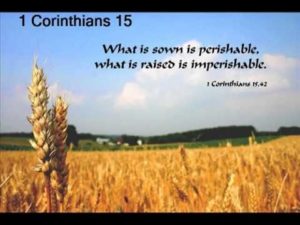
- Seeds (v. 35-38, 45-48). What is sown is not in the same form as what emerges from the ground, yet there is continuity. You plant the seed of an apple and you will get an apple tree. What comes up in harvest is more beautiful than what was sown.
- Flesh (v.39). Flesh and blood cannot inherit the kingdom of God. We will need a new body that is suited to the environment of the new heavens and the new earth. Just as the flesh of animals is different from mankind, so there can be a new kind of flesh for mankind in the resurrection.
- Heavenly Bodies (v.40-41). Just as the bodies of stars differ from moons, so the new glorified resurrection body will differ from our current earthly body although there will be a recognizable continuity between the two.
These will be bodies suited for our eternal future, whether an eternity with Christ in His kingdom or for an eternity separated from the manifestation of God’s presence in hell.
The reality of the grace of God shown to us in the resurrection should encourage believers to live for the glory of God by the power of Christ’s resurrection life.
Christ’s triumph over death in the Resurrection is God’s pledge to us that we too will be raised to eternal life at the return of Christ. Our perishable bodies will be changed into imperishable bodies.
Jesus has given us the assurance of His victory over sin and death!
1 Corinthians 15:58 58 Therefore, my beloved brethren, be steadfast, immovable, always abounding in the work of the Lord, knowing that your toil is not in vain in the Lord.
TODAY’S READING FROM THE BOOK OF PSALMS- PSALM 39:1-13
David knows what it is to be dealt with by God. He came under conviction for his sins and God drew him to repentance.
Rather than reacting towards his oppressors who taunted him, David chose to hold his tongue and meditate upon God’s Word.
Psalm 39:3 3 My heart was hot within me, While I was musing the fire burned; Then I spoke with my tongue:
Only after careful and patient meditation upon God’s Word did David dare to speak.
He realizes the futility of life apart from God. All is vanity.
Psalm 39:5 5 “Behold, You have made my days as handbreadths, and my lifetime as nothing in Your sight; Surely every man at his best is a mere breath. Selah.
Having been convicted of his sins, David prays for forgiveness:
Psalm 39:8-9 8 “Deliver me from all my transgressions; Make me not the reproach of the foolish. 9 “I have become mute, I do not open my mouth, because it is You who have done it.
Finally David prays for direction. He prays that God would turn away any disapproval and give him the strength to be restored to fellowship and strengthened to fulfill his intended function as a servant of God.
Psalm 39:12-13 12 “Hear my prayer, O LORD, and give ear to my cry; Do not be silent at my tears; For I am a stranger with You, A sojourner like all my fathers. 13 “Turn Your gaze away from me, that I may smile again Before I depart and am no more.”
TODAY’S READING FROM THE BOOK OF PROVERBS- PROVERBS 21:30-31
Proverbs 21:30-31 30 There is no wisdom and no understanding and no counsel against the LORD. 31 The horse is prepared for the day of battle, but victory belongs to the LORD.
PRAY FOR THE NATIONS-
Mali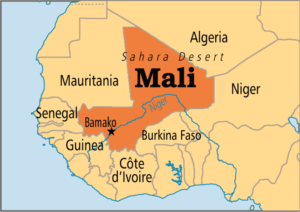
Republic of Mali
Africa
Geography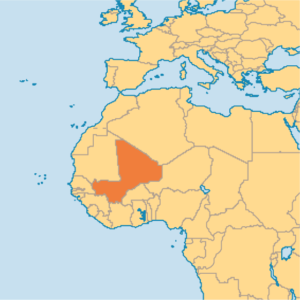
Area: 1,240,192 sq. km
Landlocked state. Dry southern grasslands merge into the Sahara Desert. The Niger River runs through the southern part of the country.
Population: 13,323,104 Annual Growth: 2.40%
Capital: Bamako
Urbanites: 33.3%
HDI Rank: 178 of 182 (UN Human Development Reports 2009)
Peoples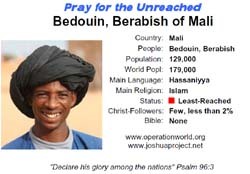
Peoples: 62 (60% unreached) All peoples
Unreached Peoples Prayer Card
- Pray for receptivity to Christ-centered evangelism and resistance to temptations to embrace the Islamic faith.
- Pray for wisdom in handling extreme issues of poverty that hinder growth and development.
- Pray for the evangelization of the Bambara people, which would impact other tribes coming to Christ.
SUMMARY
Between Algeria to the north and Niger to the east is the landlocked West African nation of Mali. Once ruled by France, Mali achieved independence in 1960. This independence came at a price, though, as a dictatorship held power for over three decades until a 1991 military coup. Yet from this political rubble has emerged one of the most stable democracies in Africa. Despite representing multiple ethnic groups of differing languages and histories, Mali has enjoyed peaceful relations among its people. Fishing in the Niger and Senegal rivers has provided a stable economy that also helps feed a developing agricultural economy.
However, Mali is one of the twenty-five poorest countries in the world. With no coastline, Mali is dependent on agricultural exports and gold mining for revenue. The harsh Sahara Desert in the north causes frequent droughts, damaging the delicate farming industry that is still struggling to develop. Attempts have been made to grow tourism, but security issues continue to hinder these efforts. Mali also has one of the world’s highest rates of infant mortality, with 106 deaths per 1,000 births. Almost half of the entire population is under the age of fifteen. Mali is also a source, transit, and destination area for men, women, and children who are subjected to forced labor and sex trafficking. Women and young girls are placed in domestic servitude as well as sold for sex. Young boys are forced to work in gold mines and the agricultural sector. Forced begging is a current issue that has yet to be addressed properly by the government.
Yet, despite the struggles and poverty, God is still there. The church, though still small, has taken root in the cultures and hearts of the Malian people. Eighty-seven percent of the population is Muslim, though the Islam practiced is moderate and tolerant. Multiple other indigenous animist beliefs are also practiced by 10% of the population, with the last 3% being the growing Christian population. Every year, the number of Christians is doubling. Due to the extreme poverty, Mali depends on the foreign aid of Libya and Saudi Arabia, who fund Malian schools which are based on Qur’anic beliefs. Most churches are combining outreach with the relief aid that is so desperately needed. Sixty percent of Malians are unreached, but there is hope in the small but fervent church that is taking shape. God’s hope is prevailing
Official language: French. Trade languages Bambara, Fulbe, Songhai Languages: 60
Religion
Largest Religion: Muslim
|
Religion |
|
Pop % |
Ann Gr |
|
351,730 |
2.64 |
2.5 |
|
|
93,630 |
0.7 |
2.5 |
|
|
Muslim |
11,641,728 |
87.38 |
|
Challenges for Prayer
Missions have multiplied and few areas of the country are untargeted, but breakthrough has not yet been seen. Mali is still a pioneer missions’ country, with two-thirds of the population unevangelized. For years there were only four Protestant missions – Avant, CMA, and then UWM and Evangelical Baptists. Only in the more receptive Avant and CMA areas have strong churches emerged. There are now over 40 agencies from all continents, comprising several hundred workers. But the trickle of responses has not yet become a flood. More and more African and even Malian ministries work here; pray for them to collaborate with foreign missions and to have a galvanizing effect on the national churches.
Bamako, the capital and only major city in the country, has 60 small churches and over 100 expatriate missionaries, but only a minority are involved in urban church planting. Many suburbs are still without a meaningful witness, even as the city rapidly grows and spreads. The churches struggle with limited facilities and with expanding what facilities do exist. A prominent, visible Christianity – with actual buildings as symbols of growth and presence – would be an answer to prayer; a dynamic, growing movement of people to Christ irrespective of physical infrastructure would be even greater!
PRAYER: We give You thanks, O God, for the gracious gift of Christ’s victory over sin and death. Your Son has brought life and immortality to light and answers the questions about the future. We have a certain hope through Jesus Christ, Your Son. His resurrection assures us of that Your Word is true and that Jesus is to be followed and obeyed as Lord of all. Give us the grace to take up our cross daily, denying self and walking in submission to Your will in the power of His resurrection life. In Jesus’ Name. Amen.
